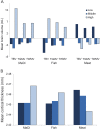Mediterranean diet and brain structure in a multiethnic elderly cohort
- PMID: 26491085
- PMCID: PMC4653103
- DOI: 10.1212/WNL.0000000000002121
Mediterranean diet and brain structure in a multiethnic elderly cohort
Abstract
Objective: To determine whether higher adherence to a Mediterranean-type diet (MeDi) is related with larger MRI-measured brain volume or cortical thickness.
Methods: In this cross-sectional study, high-resolution structural MRI was collected on 674 elderly (mean age 80.1 years) adults without dementia who participated in a community-based, multiethnic cohort. Dietary information was collected via a food frequency questionnaire. Total brain volume (TBV), total gray matter volume (TGMV), total white matter volume (TWMV), mean cortical thickness (mCT), and regional volume or CT were derived from MRI scans using FreeSurfer program. We examined the association of MeDi (scored as 0-9) and individual food groups with brain volume and thickness using regression models adjusted for age, sex, ethnicity, education, body mass index, diabetes, and cognition.
Results: Compared to lower MeDi adherence (0-4), higher adherence (5-9) was associated with 13.11 (p = 0.007), 5.00 (p = 0.05), and 6.41 (p = 0.05) milliliter larger TBV, TGMV, and TWMV, respectively. Higher fish (b = 7.06, p = 0.006) and lower meat (b = 8.42, p = 0.002) intakes were associated with larger TGMV. Lower meat intake was also associated with larger TBV (b = 12.20, p = 0.02). Higher fish intake was associated with 0.019 mm (p = 0.03) larger mCT. Volumes of cingulate cortex, parietal lobe, temporal lobe, and hippocampus and CT of the superior-frontal region were associated with the dietary factors.
Conclusions: Among older adults, MeDi adherence was associated with less brain atrophy, with an effect similar to 5 years of aging. Higher fish and lower meat intake might be the 2 key food elements that contribute to the benefits of MeDi on brain structure.
© 2015 American Academy of Neurology.
Figures

Comment in
-
Mediterranean diet is associated with reduced brain shrinkage in older people, study finds.BMJ. 2015 Oct 21;351:h5556. doi: 10.1136/bmj.h5556. BMJ. 2015. PMID: 26493230 No abstract available.
References
MeSH terms
Grants and funding
LinkOut - more resources
Full Text Sources
Molecular Biology Databases
